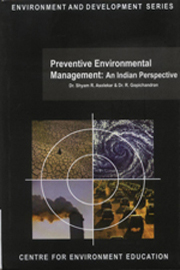Book contents
- Frontmatter
- Foreword
- Acknowledgements
- Contents
- List of Figures
- Summary
- Preface
- The Contents
- 1 The “Environment” in the Context of 21st Century
- 2 Indian Laws on Environmental Protection
- 3 The Framework and Implementation of Indian Environmental Policy
- 4 System Analysis: Knowing the Limits
- Preventive Environmental Management Tools
- Preventive Environmental Management Initiatives
- Overarching Issues
- References
- Bibliography
- Web-Resources
- About the Authors
- Abbreviations
- Index
4 - System Analysis: Knowing the Limits
from The Contents
Published online by Cambridge University Press: 05 November 2011
- Frontmatter
- Foreword
- Acknowledgements
- Contents
- List of Figures
- Summary
- Preface
- The Contents
- 1 The “Environment” in the Context of 21st Century
- 2 Indian Laws on Environmental Protection
- 3 The Framework and Implementation of Indian Environmental Policy
- 4 System Analysis: Knowing the Limits
- Preventive Environmental Management Tools
- Preventive Environmental Management Initiatives
- Overarching Issues
- References
- Bibliography
- Web-Resources
- About the Authors
- Abbreviations
- Index
Summary
While “sustainability” has been more or less accepted as the basic ruler to measure the virtues/limitations of a given model of development; the critical question, that remains to be answered, is How does one estimate and ascertain sustainability of development? This is the point where one invokes the so called “system's analysis”. Discussion and examination of the environmental systems become all the more useful and complex when one factors in the energy component. An ever increasing demand for energy and power for driving the wheel of industrial production and agriculture twinned with quantitative constraints on the use of such non-renewable resources as fossil fuels, has placed the energy sector at cross roads.
In this chapter it is argued that the recognition of Earth as an “environmental system” and our growing understanding of it coupled with the evolution of our insight regarding it over the past two decades has seen turning points in many fields and facets of environmental management. On one hand – concurrent complementary growth of NGOs crusading for the cause of environment have influenced entirely new sets of laws and regulatory programmes in India. On the other hand, environmental activism and interventions of our judiciary has made some of the most difficult and impossible regulatory measures “possible and implementable”! These two drivers pushed the polluters and regulators in a newer context in which pollution treatment became less attractive when compared with the options of waste minimization, recycle, and recovery.
- Type
- Chapter
- Information
- Preventative Environmental ManagementAn Indian Perspective, pp. 96 - 124Publisher: Foundation BooksPrint publication year: 2005



